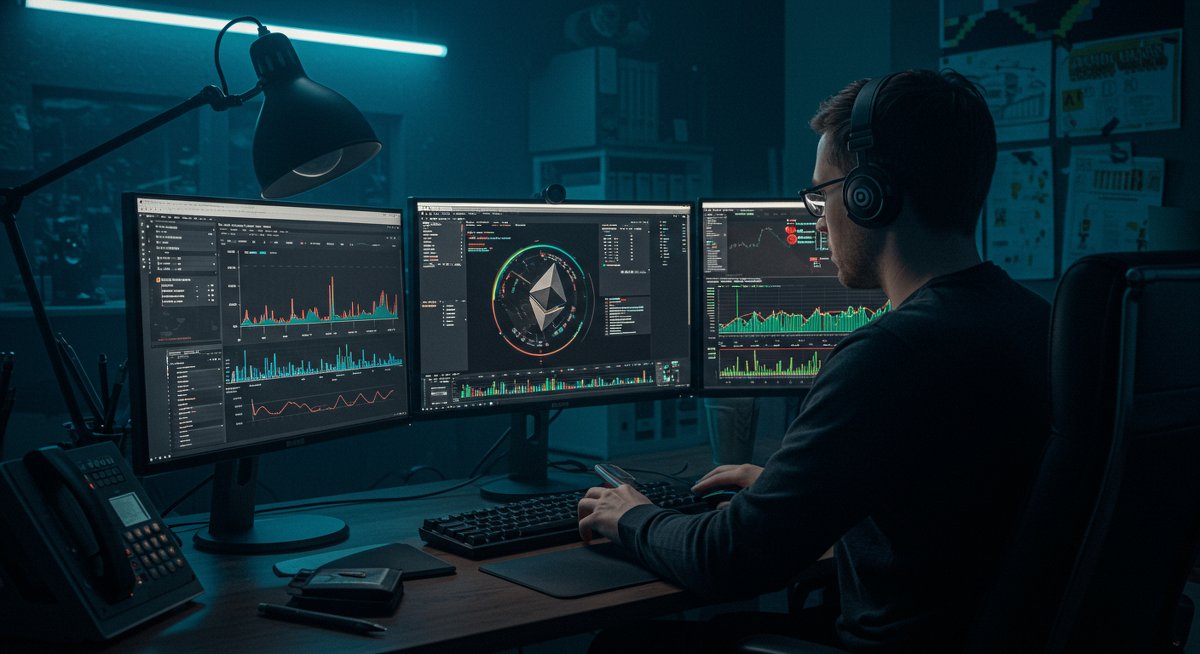Why This Got My Attention
So I was scrolling through r/ethtrader the other day and saw a post that really caught my eye. Someone was talking about a potential 51% attack on Monero and how it highlights a key difference between proof-of-work (PoW) and proof-of-stake (PoS) cryptocurrencies. It got me thinking about the long-term security of my own crypto holdings, and I figured it was worth digging into a bit more. The post referenced a tweet from Adriano Feria, an Ethereum community member, about the Monero situation. Apparently, a mining pool linked to an IOTA co-founder was offering incentives that could lead to a majority hashrate control of Monero. This isn't a hack, but more of an economic play that exploits the inherent vulnerabilities in PoW networks. And honestly, if it can happen to Monero, it could potentially happen to Bitcoin too. It made me really think about the long term implications of where I park my money in the cryptoverse.
What’s particularly interesting is the argument for Ethereum as a safer haven. Since its shift to Proof-of-Stake, the network boasts a hefty defense against similar attacks. We're talking about an attacker needing 66% of all staked ETH to successfully pull off an exploit. The post mentioned that this would trigger slashing penalties over $80 billion. I'm not sure I can verify that exact figure, but the point stands - that's a massive disincentive. The original poster argues that Ethereum's design inherently disincentivizes malicious behavior, which makes it a more attractive option for those with a long-term investment horizon. Basically it made me question everything I thought I knew about where to keep my money safe.

Decoding the Monero Situation
Let's break down what actually happened with Monero. The core issue is the profitability of mining. In a Proof-of-Work system like Monero or Bitcoin, miners are rewarded for solving complex cryptographic puzzles, which then validates transactions and secures the network. However, if a mining pool can offer significantly higher rewards, it can attract a large portion of the network's hashrate. This is exactly what seems to be happening with Qubic and Monero. According to the original Reddit post, the Qubic mining pool, run by IOTA co-founder Sergey Ivancheglo, is offering miners better rewards, incentivizing them to switch over and potentially gain majority control of Monero's hashrate. Now, this isn't necessarily a hack in the traditional sense. It's more of an economic attack where someone is essentially buying up the network's security. The post mentioned it would cost about $7,000-$10,000 a day.
The vulnerability this exposes is pretty significant, and it's not unique to Monero. Any Proof-of-Work network is susceptible to a 51% attack if a single entity or group can control more than half of the mining power. This control allows them to potentially double-spend coins, censor transactions, and generally disrupt the network. The Reddit poster makes the point that Bitcoin, despite its reputation for security, is also vulnerable. As off-chain adoption grows and the halving events cut into miner issuance, the economic incentives for miners could shift. If mining Bitcoin becomes less profitable, miners might be tempted to find more lucrative opportunities, potentially weakening the network's security. This is what BTCDigital did when they pivoted to Ethereum.
What This Means for Your Crypto Strategy
So, what does all this mean for you, the average crypto investor or trader? Well, it really boils down to your risk tolerance and investment goals. If you're primarily concerned with long-term security and minimizing the risk of network attacks, then Ethereum's Proof-of-Stake model might look increasingly attractive. The economic disincentives for attacking the Ethereum network are substantial, as highlighted in the Reddit post. The cost of acquiring 66% of all staked ETH and the potential slashing penalties make a 51% attack highly improbable. It’s also worth considering that not all crypto is created equal. Some are simply more prone to attack than others.
However, if you're a Bitcoin maximalist or believe that Bitcoin's Lindy effect and network effects provide sufficient security, then you might not be as concerned about these types of attacks. It's also important to remember that Ethereum isn't completely immune to risks. There are potential vulnerabilities in its smart contracts, and the complexity of the network can introduce new attack vectors. It’s important to note that while I do hold Bitcoin and Ethereum, I am always looking to diversify. This includes spreading my portfolio across a few stable altcoins, as well. At the end of the day it’s all about finding a portfolio that makes sense for your needs and your level of risk.
The Security Trade-Offs Nobody Discusses
Here's the thing nobody really wants to talk about: security in crypto is a trade-off. There's no such thing as a perfectly secure network. Proof-of-Work offers a certain type of security through its energy expenditure and the computational power required to attack it. But as we've seen with Monero, this security can be compromised by economic incentives and the concentration of mining power. Proof-of-Stake offers a different type of security through economic disincentives and slashing penalties. But it also introduces new risks, such as the potential for centralization of stake and the complexities of managing a large and decentralized staking network.
Another crucial point to consider is the regulatory landscape. As governments around the world grapple with how to regulate cryptocurrencies, different approaches can significantly impact the security and viability of various networks. For example, increased regulatory scrutiny on Proof-of-Work mining could make it more difficult and expensive to maintain a secure network, potentially increasing the risk of attacks. Conversely, clear and well-defined regulations for Proof-of-Stake could help to foster greater confidence and stability in these networks. What it all boils down to is doing your research to understand the full story.
Trading Crypto From Outside the US
If you're trading crypto from outside the US, there are a few additional factors to keep in mind. First and foremost, you need to be aware of the local regulations in your country. Some countries have embraced cryptocurrencies and have clear regulatory frameworks, while others are more cautious or even outright ban them. Make sure you understand the legal and tax implications of trading crypto in your jurisdiction. Depending on where you live, you might also have limited access to certain exchanges or services. Some exchanges may not be available in your country due to regulatory restrictions or other factors. In these cases, you might need to use a VPN or find alternative platforms that cater to international traders. You'll also want to consider the tax implications of your trades and holdings.
Exchange rates and currency conversion fees can also eat into your profits, especially if you're frequently trading between different cryptocurrencies and fiat currencies. Look for exchanges that offer competitive rates and low fees, or consider using a dedicated currency conversion service. And finally, remember that security is paramount, especially when trading from abroad. Use strong passwords, enable two-factor authentication, and be wary of phishing scams and other online threats. If you're using a public Wi-Fi network, consider using a VPN to encrypt your traffic and protect your data. No matter where you are, you need to be extra careful with your information.

Protecting Your Crypto: Here's How
Okay, so how do you actually put all this into practice and protect your crypto holdings? First, do your own research. Don't just blindly follow the hype or rely on what you read on Reddit. Take the time to understand the underlying technology, the security models, and the potential risks of each cryptocurrency you're considering investing in. Diversification is also key. Don't put all your eggs in one basket. Spread your investments across multiple cryptocurrencies and asset classes to reduce your overall risk. If one cryptocurrency takes a hit, you'll still have other assets to fall back on. Hardware wallets like Ledger or Trezor are great options to secure your holdings.
When choosing an exchange, look for one with a strong reputation for security and a good track record of protecting user funds. Enable two-factor authentication (2FA) on all your accounts. This adds an extra layer of security by requiring you to enter a code from your phone in addition to your password. This makes it much harder for hackers to access your account, even if they somehow manage to get your password. And finally, stay informed about the latest security threats and vulnerabilities in the crypto space. Subscribe to security newsletters, follow reputable security researchers on social media, and be vigilant about potential scams and phishing attacks. It’s an ever changing space, so you need to always be on the lookout.
My Personal Thoughts on All This
So, where do I stand on all of this? Well, I think the Reddit post raised some valid points about the potential vulnerabilities of Proof-of-Work networks and the relative security of Ethereum's Proof-of-Stake model. I'm not saying that Bitcoin is doomed or that Ethereum is the only safe option. But I do think it's important to be aware of the risks and to consider the security trade-offs when making investment decisions. Personally, I'm comfortable holding both Bitcoin and Ethereum, but I'm also diversifying my portfolio into other cryptocurrencies and asset classes to manage my overall risk. Like I said, not all crypto is created equal.
Ultimately, the best approach is to do your own research, understand the risks, and make informed decisions based on your individual circumstances and risk tolerance. Don't let fear or hype drive your investment decisions. Take a rational and objective approach, and you'll be much more likely to succeed in the long run. And remember, the crypto landscape is constantly evolving, so it's important to stay informed and adapt your strategy as needed. Whether or not I'll be holding Bitcoin in 6 years is something only time will tell. Regardless, I am happy I started looking into this more and expanding my portfolio.